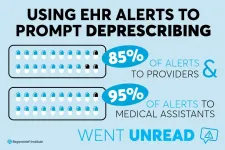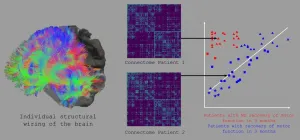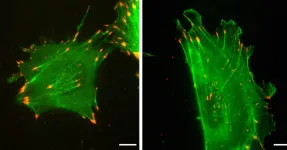(Press-News.org) PULLMAN, Wash. - Even before the pandemic made Zoom ubiquitous, Washington State University researchers were using the video conferencing app to research a type of cannabis that is understudied: the kind people actually use.
For the study, published in Scientific Reports, researchers observed cannabis users over Zoom as they smoked high-potency cannabis flower or vaped concentrates they purchased themselves from cannabis dispensaries in Washington state, where recreational cannabis use is legal. They then gave the subjects a series of cognitive tests.
The researchers found no impact on the users' performance on decision-making tests in comparison to a sober control group but did find some memory impairments related to free recall, source memory and false memories.
While the findings are in line with previous research on low-potency cannabis, this study is one of the few to investigate cannabis that contains much more than 10% tetrahydrocannabinol (THC), the plant's main psychoactive ingredient. This is only the second known study to examine the effect of cannabis concentrates.
"Because of federal restrictions to researchers, it was just not possible to study the acute effects of these high-potency products," said Carrie Cuttler, WSU psychologist and lead researcher on the study. "The general population in states where cannabis is legal has very easy access to a wide array of high- potency cannabis products, including extremely high-potency cannabis concentrates which can exceed 90% THC, and we've been limited to studying the whole plant with under 10% THC."
While 19 states and Washington D.C. have legalized cannabis for recreational use, the U.S. federal government still classifies it as a Schedule 1 drug, implying it has a high potential for abuse and no medicinal benefits. Until recently, researchers interested in studying cannabis were limited to using low-potency plants of around 6% THC supplied by the National Institute of Drug Abuse. In June, the U.S. Drug Enforcement Administration indicated it may allow some companies to start growing cannabis for research purposes.
For this study, which began in 2018, Cuttler and her colleagues found a way to study the effects of high-potency cannabis while still complying with federal guidelines. The study participants bought their own products and used them in their own homes. They were never in a laboratory on federal property, and the researchers never handled the cannabis themselves. Participants were not reimbursed for their purchase. Instead they were compensated for their time with Amazon gift cards. All participants were over 21 and experienced cannabis users who reported no past negative reactions to cannabis like panic attacks. The study's method was cleared by WSU Division of the Office of the Attorney General and the university's research ethics board.
The 80 participants were divided into four groups: two groups used cannabis flower with more than 20% THC but one containing cannabidiol (CBD), a non-psychoactive component of cannabis, and the other without CBD. Another group vaped cannabis concentrates with more than 60% THC that included CBD. A fourth group remained sober.
For all cannabis using groups, the researchers found no effect on a range of decision-making tests including risk perception and confidence in knowledge. On a few memory tests there were also no significant differences between the cannabis-using and sober groups, including prospective memory, the ability to remember to do things at a later time, such as attend an appointment. The cannabis-using participants also did well on temporal order memory, the ability to remember the sequence of previous events.
However, the groups that smoked cannabis flower with CBD did worse on verbal free recall trials- they were unable to recall as many words or pictures that were shown to them compared to the sober group. This finding was contrary to a small number of previous studies indicating CBD might have a protective effect on memory. The groups that used cannabis without CBD and the group that used concentrates, performed worse on a measure of source memory which means being able to distinguish the way previously learned information was presented.
Finally, all three cannabis-using groups did poorly on a false memory test - when given a new word and asked if it had been presented before, they were more likely to say it had when it had not.
There was also an unexpected finding: people who vaped the high-potency concentrates with more than 60% THC performed comparably to those who smoked cannabis flower. This may have been because they tended to self-titrate - using less of the drug to achieve a similar level of intoxication and impairment as the people who smoked the less-potent cannabis flower.
Cuttler said this was cause for cautious optimism on the little-studied but widely available concentrates.
"There's been a lot of speculation that these really high-potency cannabis concentrates might magnify detrimental consequences, but there's been almost zero research on cannabis concentrates which are freely available for people to use," said Cuttler. "I want to see way more research before we come to any general conclusion, but it is encouraging to see that the concentrates didn't increase harms."
INFORMATION:
INDIANAPOLIS -- The vast majority of electronic health record (EHR) alerts attempting to reduce the prescribing of high-risk medications linked to dementia in older adults went unread in a study led by research scientists from Regenstrief Institute, Purdue University and Indiana University School of Medicine. The goal of the intervention was to facilitate the deprescribing of anticholinergics through both provider and patient-based alerts, however, engagement with the alerts was so low, the study team was unable to conclude if this approach could be ...
When blood flow to the brain is somehow reduced or restricted, a person can suffer what we know as a stroke (from "ischemic stroke" in medical jargon). Stroke is one of those conditions that seems fairly common. This isn't a misperception: just in Europe, there are over 1.5 million new cases each year.
Some strokes can be lethal, and when they're not they often result in serious damage to the victim's ability to move. In fact, stroke is one of the major causes of long-term disability today. Recovery can be a long and arduous road. Again, in Europe, under 15% of the patients ...
Software to help towns and cities use street-planting to reduce citizens' exposure to air pollution has been developed by researchers at the University of Birmingham.
Street planting, or 'green infrastructure', is an essential part of the urban realm, but there is a misconception that plants remove or 'soak up' a lot of pollution. Instead, planting at this scale primarily serves to redistribute pollution by changing air currents within streets and beside open roads.
Because of this, not only the position and amount of planting within a street, but also ...
Astronomers have designed and trained a computer program which can classify tens of thousands of galaxies in just a few seconds, a task that usually takes months to accomplish.
In research published today, astrophysicists from Australia have used machine learning to speed up a process that is often done manually by astronomers and citizen scientists around the world.
"Galaxies come in different shapes and sizes" said lead author Mitchell Cavanagh, a PhD candidate based at The University of Western Australia node of the International Centre for Radio Astronomy Research (ICRAR).
"Classifying the shapes of galaxies is an important step in understanding their formation and evolution, and can even shed light on the nature of the Universe itself."
Mr Cavanagh said that ...
Most common bone and joint (orthopaedic) procedures, such hip replacements and shoulder repair surgery, are not backed up by high quality evidence, mainly because of a lack of definitive trials, suggests an analysis of data published by The BMJ today.
Yet despite the lack of strong supporting evidence, some of these procedures are still recommended by national guidelines in certain situations, the findings show.
Musculoskeletal conditions affect around 1 in 4 UK adults and account for over 25% of all NHS surgical interventions at a cost of £4.76 billion each year.
National ...
Muscle relaxant drugs are largely ineffective for low back pain, despite being widely prescribed for this condition, suggests an analysis of the latest evidence published by The BMJ today.
The findings show that muscle relaxants might reduce pain in the short term, but the effect is too small to be considered clinically meaningful, and there is an increased risk of side effects.
But the researchers stress that the certainty of evidence is low and say large trials are urgently needed to resolve uncertainties around the use of these drugs for back pain.
Low back pain is a global public health problem and muscle relaxants (a broad class of drugs that include ...
Mandatory covid-19 vaccination for care home workers is unnecessary, disproportionate and misguided, warn experts
And is based on unreliable data
In The BMJ today, experts argue that mandatory vaccination is "unnecessary, disproportionate, and misguided."
The government decision to remove the right of care home staff in England to choose whether or not to be vaccinated against covid-19 is a profound departure from public health norms. The intended next step is a rapid and massive expansion of compulsory vaccination to legally require covid-19 and flu vaccination of all frontline health and social care workers, subject to consultation.
But Lydia Hayes, Professor of Law at Kent ...
An estimated 8.4 billion people could be at risk from malaria and dengue by the end of the century if emissions keep rising at current levels, according to a new study published in The Lancet Planetary Health.
The research team estimates that this worst-case scenario would mean the population at risk of the diseases might increase by up to 4.7 additional billion people (relative to the period 1970-1999), particularly in lowlands and urban areas, if temperatures rise by about 3.7°C 1 by 2100 compared to pre-industrial levels.
The study was led by the London School of Hygiene & Tropical Medicine (LSHTM) with partners from Umeå University, Sweden; Abdus Salam ...
LOS ANGELES - A new prognostic tool developed by researchers from the UCLA Jonsson Comprehensive Cancer Center and five other institutions helps predict which men with advanced metastatic prostate cancer will respond favorably to a novel targeted therapy.
The tool, described in a study published today in Lancet Oncology, analyzes a wide spectrum of imaging and clinical data and is intended to assist physicians considering treating patients with Lutetium-177 prostate-specific membrane antigen, or LuPSMA.
LuPSMA, which binds to PSMA proteins and delivers targeted radiation to prostate cancer tissue, offers a new option to men with PSMA-positive metastatic cancer that is castration-resistant, meaning it has stopped ...
The protein actin is ubiquitous and essential for life. In mammals, every cell expresses two of its forms, beta-actin and gamma-nonmuscle-actin. Despite having distinct roles, the two forms are nearly identical, sharing 99% of their amino acid sequence.
Research by Anna Kashina of Penn's School of Veterinary Medicine and colleagues has shown that, contrary to scientific dogma, it's not the slight differences in amino acid sequence that govern these proteins' discrete functions in the cell. Rather, their nucleotide sequences--the "letters" that make up their DNA coding sequence, which differ by roughly 13% between the two forms--are responsible for their individual roles in organisms' ...



